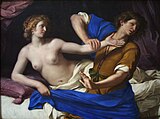| |||||||||||
| Potiphar pꜣ-dj-pꜣ-rꜥ in hieroglyphs | |||||||||||
|---|---|---|---|---|---|---|---|---|---|---|---|
Potiphar (/ˈpɒtɪfər/ POT-if-ər; Hebrew: פּוֹטִיפַר/פּוֹטִיפָר, Modern: Pōṭīfar, Tiberian: Pōṭīp̄ar/Pōṭīp̄ār; from Late Egyptian: pꜣ-dj-pꜣ-rꜥ, lit. 'he whom Ra gave'[1]) is a figure in the Hebrew Bible and the Quran. His name possibly indicates the same figure as Potiphera (Hebrew: פוטיפרע).
Potiphar is the captain of the Egyptian king's guard who is said to have purchased Joseph as a slave and, impressed by his intelligence, makes him the master of his household. Potiphar's wife, who was known for her infidelities, took a liking to Joseph and attempted to seduce him. When Joseph refused her advances and ran off, leaving his outer vestment in her hands, she retaliated by falsely accusing him of trying to rape her, and Potiphar had Joseph imprisoned.
What happened to Potiphar after that is unclear; some sources identify him as Potipherah, an Egyptian priest whose daughter, Asenath, marries Joseph.[2] The false accusation by Potiphar's wife plays an important role in Joseph's narrative because had he not been imprisoned, he would not have met the fellow prisoner who introduced him to Pharaoh. Likewise, the fate of Potiphar's wife is unclear but some sources say she was stricken with illness.[3]
Rachel Adelman suggests that both Potiphar and his wife were sexually attracted to Joseph and tried to use him for their own purposes. But Potiphar's attempts were thwarted via castration, according to Talmudic legend. She believes the story is a criticism of Jewish assimilation since foreigners like Potiphar and his wife would seduce Jews to sin.[4]
The medieval Sefer HaYashar, a commentary on the Torah, gives Potiphar's wife's name as Zuleikha, as do many Islamic traditions - thus the Persian poem called Yusuf and Zulaikha from Jami's Haft Awrang "Seven thrones".
The story became prevalent in Western art during the Renaissance and Baroque periods, usually depicting the moment when Joseph tears himself away from the bed containing a more-or-less naked figure of Potiphar's wife. Persian miniatures often illustrate Yusuf and Zulaikha in Jami's Haft Awrang ("Seven thrones").







